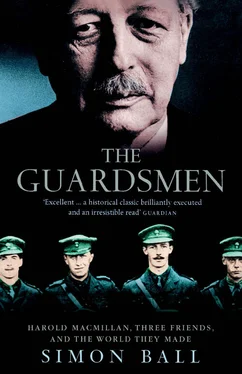Digging deeper trenches and counter-mines became an unpleasant necessity for the Guards. Percy Clive and Crookshank were leading a digging party into an orchard near the trenches when they were caught in a German mine explosion. By the greatest good fortune they were just short of the mine when it went off. The whole ground moved up in one great convulsion, and when it settled down several men were completely buried. Clive was shot straight up in the air by the blast and came down so doubled up that he nearly knocked his teeth out with his knees. Crookshank, on the other hand, was buried by the earth thrown up in the explosion. It was a perilous situation. He was trapped in an earthen tomb, quite unable to move. No one on the surface could see where he was. If no one came to his rescue he would suffocate. If Clive had rescued Cranborne’s platoon from certain death by disobeying Jeffreys’s order to advance, his quick thinking saved Crookshank also. Although cut, bruised and groggy himself, he had enough presence of mind to work out where Crookshank had been standing just before the mine went off. Clive directed his men to dig hard. 57 A brother officer estimated that Crookshank had been buried for twenty minutes before the rescue party dug him out. He was in a state of shock but otherwise unhurt. He ‘won his name’ by his insouciant reaction to his experience. By evening he had returned to duty with the company. ‘He didn’t seem to worry at all at his misfortune,’ in the recollection of an officer in 3 Company, ‘and carried on duty as soon as he had been disinterred, minus, however, his cap, and the one he borrowed from a private soldier didn’t fit, and this was his only trouble!’ 58 Crookshank’s own account of the incident was suitably laconic: ‘I was…buried for a long time, but rescued in the end.’ 59
Of any of the quartet Macmillan adapted least well to army life. In his memoirs he famously drew the distinctions between ‘gownsmen’ and ‘swordsmen’, characterizing himself as one of the former who had by force of circumstances become one of the latter. 60 Lyttelton and Crookshank threw themselves into the role of regimental officer with enthusiasm, whereas Macmillan tried to re-create an intimate bookish coterie in the trenches. ‘My library is indeed very wide and Liberal,’ he noted with satisfaction, already thinking of posterity. ‘I shall try to send back some which I have read and should like to preserve. I have written inside “France Sept. 1915.”’ ‘I have a friend who was said to have read the Iliad “to make him fierce”,’ he told his mother. ‘I confess that I prefer to do so to keep myself civilized. For the more I live in these warlike surroundings, the more thankful I am for all the traditions of the classic culture compared to which these which journalists would have us call “the realities of life” are little but extravagant visions of a fleeting nightmare, lacking true value or permanency.’ 61 Macmillan and his friend Bimbo Tennant were delighted, for instance, when they rode over for dinner with a friend at the 1st Battalion to find most of the officers, ‘snorting Generals and Majors’, absent. ‘We had,’ Tennant told his mother, ‘a delightful evening à trois and had one good laugh after another, being all blessed with the same sense of humour, and unhampered by any shadow of militarism.’ 62 Lyttelton’s letters too were full of pleas for books, but he wanted ‘shockers’ rather than Homer or Theocritus. He even enjoyed Greenmantle by his mother’s friend John Buchan, despite the fact that ‘he hasn’t been within a hundred yards of the truth yet’. 63
It was with heartfelt relief that the Guards left Givenchy and marched south. Now that the Guards Division had assembled, Lyttelton, Crookshank and Macmillan were all present. Lyttelton was mounted at Cavan’s side, Crookshank was marching with the 2nd Battalion, Macmillan with the newly arrived 4th Battalion. They all met up at the end of August. To mark the combination of all four Grenadier battalions in one Guards formation, the regiment held a formal dinner to celebrate the occasion. It was, as Macmillan reported, ‘a most unique dinner party. All the officers of the Regiment who are in France – (that) is in the four battalions or on the Staff…There were 96 of us in all.’ 64 Even the newest and most temporary Grenadier officer was made to feel part of an exclusive club as well as a great and glorious enterprise. ‘I saw many old friends,’ wrote Harold’s fellow 4th Battalion new boy, Bimbo Tennant, ‘and was very happy.’ 65 Just as important as the élan of the Guards Division was a sense of a more scientific approach to the new warfare. The battalions carried out practice attacks on mock-ups of trenches under the watchful eyes of Jeffreys and Seymour. The army had realized that rifle and bayonet were not necessarily the most effective tools for trench warfare. Weapons that could give infantry more ‘bang for their shilling’, such as grenades, machine-guns and mortars, were coming into vogue. Macmillan was nominated as a bombing officer and spent his time training troops in his battalion in grenade techniques. 66
The esprit de corps of the young officers did little to avert disaster at their next engagement, the battle of Loos. It is doubtful whether the Guards Division’s attack at Loos ever had a chance: ‘it had to start from old German trenches, the range of which the German artillery knew to an inch, while the effect of our own original bombardment had died away’. 67 Crookshank and the 2nd Battalion arrived on the battlefield on 26 September 1915. During the 27th they slowly worked their way into the old German trenches, Crookshank in the rearguard. Despite their proximity to the battle, however, the order never came to attack. 68 The 4th Battalion, however, bore the brunt of it. It was Macmillan who was to experience the full force of the battle.
Owing to incompetent staff work, the 4th Battalion had spent the 26th uncomfortably sitting on a muddy road while a cavalry corps passed by. 69 Next day the battalion officers were gathered together by their commanding officer, Claud Hamilton, and told they were to attack Hill 70 just to the east of Loos. Macmillan’s company commander, Aubrey Fletcher, was sent forward to discover the best route into Loos. 70 Macmillan himself did ‘not feel frightened yet, only rather bewildered’. 71 At 2.30 p.m. on the 27th the battalion advanced down the road into Loos in dispersed formation. They were immediately and heavily shelled by German artillery. To make matters worse, they were enfiladed from the right by a German machine-gun. As they approached Loos, Aubrey Fletcher led them running down a slope into an old German communications trench. Unfortunately he had taken them the wrong way. The brigade commander came galloping down the road and ordered the battalion not to enter the trench but follow him in an entirely different direction. The result was chaos, with the battalion split in half. In the confusion, neither half of the battalion could find the other. The main body of the Grenadiers attacked Hill 70 with the Welsh Guards. Macmillan was lucky to miss this assault. The Guards swept forward taking heavy casualties, but reached the crest of Hill 70. In the heat of battle, however, the Grenadiers advanced too far over the crest and exposed themselves to fire from the next German line. All who took part in this attack were killed. 72
Meanwhile the remainder of the battalion, including Macmillan, under the leadership of Captain Jummie Morrison, had no orders whatsoever. They decided to attach themselves to the 2nd Guards Brigade and attack Puits 14, a German strongpoint to the north. This attack too was a disaster. Unbeknown to the Grenadiers, the 2nd Guards Brigade had withdrawn without them: they thus ‘found themselves completely isolated’. 73 They had to try and escape by crawling away from the German line. Jummie Morrison was too fat to be a good crawler. As he and Macmillan tried to take their turn, Macmillan was shot in the head. He was incredibly lucky – it was a glancing blow. He was, however, concussed and no longer capable of taking an active part in proceedings. 74 As the small, lost and bewildered force tried to make themselves safer by digging in, Macmillan was shot again, this time in the right hand. The bullet fractured his third metacarpus bone. With his right arm crippled and in excruciating pain, he was ordered by Morrison to go back and find a clearing station. The hand wound proved to be much more serious than the head wound: Macmillan was troubled by his right arm for the rest of his life. Within a few days he found himself in hospital at Rouen, ‘more frightened than hurt’.
Читать дальше












